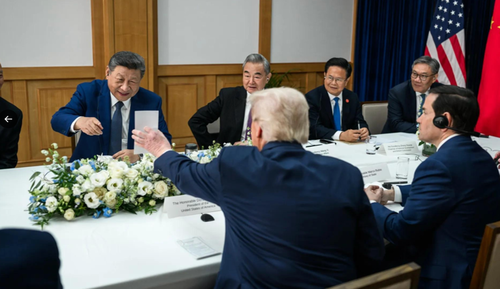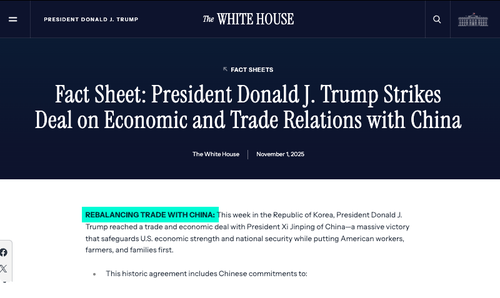White House Unveils Details Of U.S.-China Deal, Including Resolution To Nexperia Auto Chip Crisis
The White House on Saturday unveiled a comprehensive breakdown of the U.S.-China trade and economic deal reached by President Donald Trump and President Xi Jinping while on the sidelines of the Asia-Pacific Economic Cooperation summit last week.
The deal restores stability to global markets, strengthens U.S. industry, and marks a geopolitical win for Washington, according to the White House.
Here are the key commitments:
-
Fentanyl Crackdown: Halt exports of chemical precursors used to make fentanyl and tighten global export controls on designated substances.
-
Critical Minerals: Suspend and effectively eliminate new and existing export controls on rare earths, gallium, germanium, antimony, and graphite, allowing unrestricted global supply to U.S. industries.
-
Trade Retaliation Rollback: Remove all tariffs and non-tariff countermeasures imposed since March 2025, including those targeting U.S. agriculture and technology firms.
-
Agricultural Purchases: Commit to buy 12 million metric tons of U.S. soybeans by year-end, and 25 MMT annually through 2028, alongside renewed imports of sorghum and hardwood logs.
-
Semiconductor Resolution: Ensure Nexperia’s China facilities can resume exporting legacy automotive chips, easing global supply chain strain.
-
Industrial Policy Reversal: Terminate investigations targeting U.S. semiconductor and logistics firms and lift sanctions on maritime and shipping entities.
-
Tariff Exemptions Extended: Keep U.S. import exclusions active through 2026, signaling policy de-escalation.
Focusing on the semiconductor resolution commitment, the standoff between the EU, U.S., and China over Netherlands-based Nexperia appears to have resolved, one that could’ve thrown the global auto supply chain into total dysfunction.
Recall that in October, the Dutch government seized control of Nexperia, owned by China’s Wingtech Technology, over national security concerns. Beijing retaliated by blocking Nexperia’s exports from China, disrupting European and some Asian auto supply chains.
Disruptions:
-
VW Halts Golf Production In Wolfsburg As Chip Shortage Worsens
-
Nexperia-Linked Chip Shortages Ripple Through Global Auto Supply Chain, From Germany To Japan
For now, trade tensions between the U.S. and China have subsided. In fact, the recent tit-for-tat measures were about each side gaining leverage before Trump and Xi sat down at the negotiating table last week. This resolution on multiple fronts, including the Nexperia chip dispute, is a big sigh of relief.
Tyler Durden
Sun, 11/02/2025 – 15:45ZeroHedge NewsRead More






 R1
R1
 T1
T1


